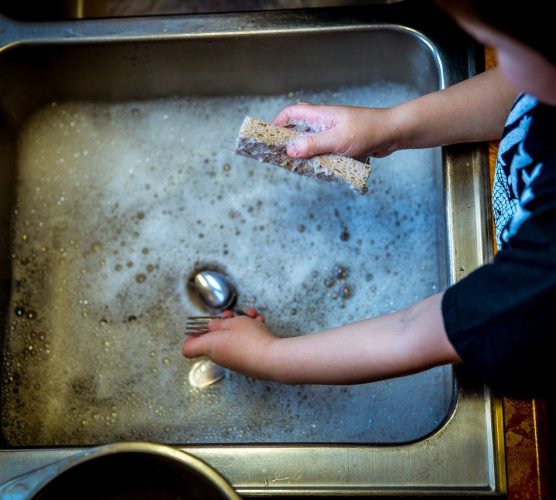
Koru Kids has after school nannies in your local area
It’s one of modern parenting’s dilemmas: you want to encourage your child to take responsibility and embrace independence, but you don’t want to be that nagging parent who makes household chores a pain they resent you for (and potentially refuse to join in!). Here’s how to get your children onboard with helping around the house, without all the stress.
Make your expectations clear
Save the whole family frustration by making it clear from the start what your expectations are around the home. What age-appropriate basics do you want your children to be managing every day? Putting toys away before moving on to another activity or making their bed each morning, for example?
You can help younger children by making a visual schedule of tasks or taking photos of what each room should look like at the end of the day, then everyone will know exactly how to keep the house tidy ready for the next day’s fun.
Play therapist and parenting coach, Aideen McCartney of Playful Pathways suggests: “If there are certain big jobs that need to be done in the house, make a regular event of doing them together as a family. This might mean putting aside 30 minutes on a weekend and all folding your clothes and putting them away at the same time, or having a regular time of day (e.g. the five minutes before dinner is ready) when everyone knuckles down to get the toys from the day tidied away.”
“You could then follow this up with some sort of shared family celebration time, where you all get to do something that you enjoy together!”
What's more, if you start by making certain tasks a non-negotiable part of your family routine, there will be less resistance as everyone knows what’s expected of them.
Start them young

Capture their enthusiasm young! Little children often want to help their parents out to join in the fun and feel grown-up – even if they can’t actually be that useful!
“Although it can be tempting to refuse their help (especially when we think it will make things more difficult for us) it's really important to make the most of their enthusiasm by giving them age and skill-appropriate tasks that make them feel like they're helping,” continues Aideen. “By allowing and encouraging our children to help it makes them feel included and useful, and gives them a sense of achievement and responsibility. And of course, grows their skills in and awareness of these activities.”
Examples of age-appropriate chores include:
2-4 years old:
- Help make bed
- Pick up toys
- Help clean spills
- Help dust and wipe surfaces
- Help sort laundry
- Help water plants
5-7 years old:
- Help load dishwasher
- Help put away groceries
- Put dirty clothes in washing machine
- Help set the table
8-11 years old:
- Help hoover
- Help make meals
- Prepare breakfast
- Help wash the car
By giving our children age-appropriate chores from the start (even if they can’t do a perfect job) it becomes a lot easier to get your children motivated as they get older. If you keep turning your child away now, they’ll be less interested in getting involved as they grow.
Make it fun!
The more enjoyable you can make helping around the house, the easier it will be to get your kids onboard. With expectations established (and arguing removed) it’s time to think about how you can make the process of chores less of a grind and something they’ll be happy to get involved with. With the right attitude, helping around the house can be a chance to be silly and bond together.
Claire Russell, Creator of fun kids activity prompts, PlayPrompts, suggests starting by putting on music: “It can be really motivating and make a mundane task feel more fun. Or put on a timer – you can find fun apps on your phone with rockets etc – see how much they can get done in one minute!”
Value their efforts

Claire also recommends lots of praise. Our children love to know they’re doing well in our eyes, so any appreciation of their efforts spurs them on and establishes the idea that doing things around the house together can be a time to connect.
Aideen also notes the importance of valuing our children’s efforts and explains: “Children grow into our expectations for them – if we tell them how proud we are of the way that they take responsibility for themselves and their tasks, or that we notice the way that they volunteer to help without being asked, they will be more likely to continue doing these things.”
Try ‘when… then’
If you’re still having a challenge with your children to get things done, make it clear why it’s important to your family routine. Rather than resorting to bribery or threats, explain how certain tasks have to be done before you can continue having fun.
For example, ‘when we’ve tied up these toys, then we can go out to the playground’ or ‘when we’ve finished putting away these clothes, then I can make a snack’.
It’s important that our children know that household chores are something everyone needs to take responsibility for in life, but that as a family you can work together to make it as fun and easy as possible!
How do you feel about getting your children to help around the house and which of these tips will you be trying next? Share these tips with other family members so the adults of the house can be on the same page!
Koru Kids has after school nannies in your local area



